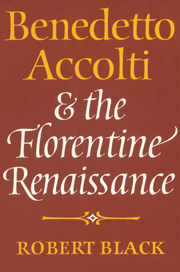Book contents
- Frontmatter
- Contents
- Dedication
- Preface
- Abbreviations
- 1 Arezzo in the early Renaissance
- 2 The Accolti family
- 3 Benedetto Accolti's early life and works
- 4 Accolti in Florence and Arezzo in the 1440s and early 1450s
- 5 Accolti's election as chancellor of Florence
- 6 The Florentine chancellorship
- 7 The Florentine chancery under Accolti
- 8 Accolti's Dialogus
- 9 Accolti's history of the first crusade and the Turkish menace
- 10 Accolti and Renaissance historiography
- Epilogue
- Appendix I Letters of Benedetto Accolti
- Appendix II Accolti's work as a palace official during his chancellorship
- Appendix III Pratica concerned with increasing Accolti's salary as chancellor
- Appendix IV Accolti and the incident of Ponzano, July–August 1463
- Select bibliography
- Index
10 - Accolti and Renaissance historiography
Published online by Cambridge University Press: 12 October 2009
- Frontmatter
- Contents
- Dedication
- Preface
- Abbreviations
- 1 Arezzo in the early Renaissance
- 2 The Accolti family
- 3 Benedetto Accolti's early life and works
- 4 Accolti in Florence and Arezzo in the 1440s and early 1450s
- 5 Accolti's election as chancellor of Florence
- 6 The Florentine chancellorship
- 7 The Florentine chancery under Accolti
- 8 Accolti's Dialogus
- 9 Accolti's history of the first crusade and the Turkish menace
- 10 Accolti and Renaissance historiography
- Epilogue
- Appendix I Letters of Benedetto Accolti
- Appendix II Accolti's work as a palace official during his chancellorship
- Appendix III Pratica concerned with increasing Accolti's salary as chancellor
- Appendix IV Accolti and the incident of Ponzano, July–August 1463
- Select bibliography
- Index
Summary
(i) Accolti's historical thought
Benedetto Accolti's preoccupation with history impressed his contemporary, Vespasiano da Bisticci, who wrote that he ‘had universal knowledge of … histories’, and Accolti was apparently already contemplating and even planning a longer work of history on the crusades – which was to become his De bello – while composing the dialogue, where he declares,
Not long ago many Christian princes gathered to recover the city of Jerusalem and Christ's sepulchre from the infidel – how great, how admirable, how similar to the deeds of the ancients would theirs seem if worthy authors had only celebrated them!
Accolti's dialogue is itself a work of historical research: besides revealing wide reading of classical authors including Cicero, Livy, Sallust, the elder Seneca, Lucan, Justin, Polybius and Josephus, who were the sources for Accolti's picture of the ancient world, the work also shows the study of patristic authors such as Augustine, Jerome, Athanasius, Basil, Chrysostom and Eusebius for his portrait of the ancient church and of a recent author such as Bruni for modern history. His two completed Latin compositions did not satisfy his historical enthusiasm, as was noted by Vespasiano, who wrote that ‘he wanted to pursue history up to his own times, part of which he completed having written the history of Godfrey of Bouillon's expedition to the holy land’; indeed, at the end of the preface to De bello, he himself wrote to Piero de' Medici, ‘If you do not regard my work as entirely inept, I shall be encouraged to pursue the study of history more keenly in the future.’
- Type
- Chapter
- Information
- Benedetto Accolti and the Florentine Renaissance , pp. 286 - 329Publisher: Cambridge University PressPrint publication year: 1985



